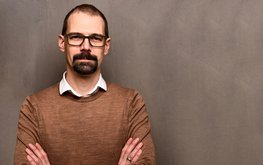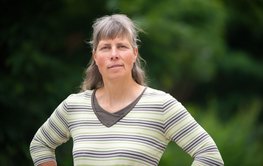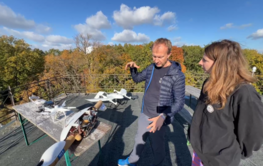The long-term goal is an early warning system for all natural hazards and all the people on earth. Interview with Abror Gafurov on the occasion of the COP29 in Baku.
She was awarded the International Hydrology Prize by the IAHS, UNESCO and WMO for her work on analysing and managing flood risks at a conference in Brazil.
The IHK Potsdam honoured the most successful trainees of the year. Noah Schmidt completed his apprenticeship as an electronics technician at GFZ with an outstanding exam. Congratulations & interview
‘We need to focus more on land use change,’ says Prof Martin Herold in an interview on the occasion of the 29th Conference of the Parties to the UN Framework Convention on Climate Change COP29 in Baku
At the 22nd Autumn School of the GFZ School Lab, scientists from various research institutions offered training to around 100 teachers on the topic of ‘Urban spaces: hotspots in the Earth system’.
The committee advises the National Research Data Infrastructure NFDI. It aims to optimise the indexing, storage and access to the increasing amount of research data.
New genetic methods can differentiate between the DNA of living and dead microorganisms. This enables deciphering the diversity of life and its processes under extreme conditions.
In the EU project GERACLE, an international team coordinated by the GFZ will investigate consequences of polarity reversals in the Earth's magnetic field. 3.3 of 10 mio euros will go to the GFZ.
In October 1994, the drilling for the deepest hole in Germany reached its final depth of more than 9 kilometres. A ceremony with an open day was held on site in Windischeschenbach (Bavaria).
Twitch streamer Sofia Kats & Felix Pohl from the UFZ reported live in a new format of science communication - about drones & satellites, mountain formation & earthquakes. Watch the video here.


![[Translate to English:] [Translate to English:] Abror Gafurov von dem Schriftzug "Welcome to Azerbaijan" und den UN und COP Logos](/fileadmin/_processed_/2/5/csm_2024_11_Baku_COP29_Abror_Gafurov_512f85b5e2.jpeg)


![[Translate to English:] Martin Herold standing in front of the library on the Telegrafenberg](/fileadmin/_processed_/c/d/csm_Martin_Herold_1cfbe99391.jpeg)
![[Translate to English:] Many people are listening to a presentation in the GFZ lecture hall.](/fileadmin/_processed_/c/a/csm_1_Bild1_hell_6be603fa54.jpeg)




